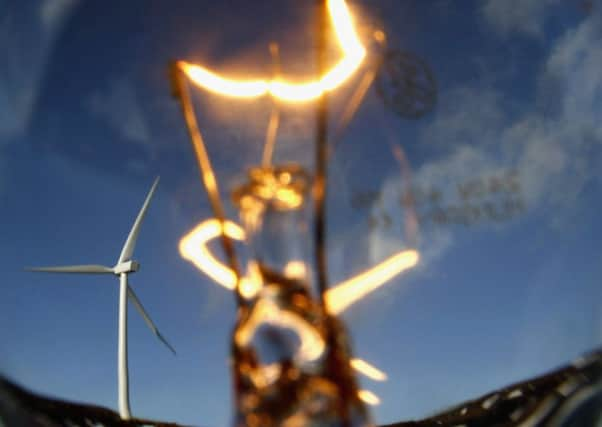Niall Stuart: Renewable energy is still hot favourite


The growth of Scotland’s renewable energy industry is an incredible success story, written by the enthusiasm and determination of the thousands of people across Scotland who work in the sector.
It is those people, and the organisations they work for, who have taken renewables from a significant but small part of our energy mix just ten years ago to Scotland’s main source of electricity generation today.
Advertisement
Hide AdAdvertisement
Hide AdAnd it is their individual actions that have added up to that success which will be recognised at the Scottish Green Energy Awards in Edinburgh later this year.
In the past the awards have honoured MSPs, council leaders, community co-ops, multinational energy firms and some of the sector’s most well-kent faces.
But it’s the stories behind the winning projects, people and businesses which have made this event so special.
In 2005, the Beatrice offshore wind farm became Scotland’s first – two turbines in the Moray Firth, developed by Talisman Energy to provide power for the Beatrice Alpha oil platform. That year, the project was named Best Innovation at the Green Energy Awards. And time has proven what a world-leading development it is, with SSE now building a 588MW wind farm on the same site, with plans to begin generating power for the national grid in 2019.
Scottish Renewables has always sought to celebrate innovative projects with the Scottish Green Energy Awards, and another which broke new ground was the Glenshellach biomass district heating scheme in Oban.
This scheme, developed by West Highland Housing Association, used a 600kW biomass boiler to warm 44 homes, and was named Best Renewable Project in 2006.
Today low-carbon heat is steadily rising to the very top of the energy policy agenda, with heating for our homes and businesses making up more than half of the country’s carbon emissions.
Biomass – using local wood products to produce heat (and often electricity too) – has become a significant business. District heating, where a number of homes are served by one boiler, is seen as a potential solution not only to our society’s climate change-causing carbon emissions, but also to fuel poverty.
Advertisement
Hide AdAdvertisement
Hide AdToday, there are dozens of schemes like Glenshellach – with most still breaking new ground and pushing the boundaries of the possible.
People, as well as projects, have defined the history of the Scottish Green Energy Awards.
Green MSP Patrick Harvie has been a long-time supporter of our industry, and was named Best Politician in 2009. He’d recently argued strongly for the approval of the Beauly-Denny power line, for an increased government commitment to energy efficiency and supported calls for more funding to be given to Scotland’s nascent marine energy sector.
In 2011, Alex Salmond received the same honour, shortly after raising Scotland’s renewables ambitions to new heights. He’d announced in 2010 that the country would seek to source 80 per cent of electricity consumption from green sources, such as wind and wave power, by 2020, up from the previous 50 per cent target.
Scotland’s community organisations have benefitted from the rise in renewable energy generation, with locally-owned and community projects now totalling of 1,100MW of capacity – just shy of the capacity of Torness nuclear power station.
This is another area which has always been at the very heart of the Scottish Green Energy Awards.
Wick Community District Heating Scheme picked up the Best Community Initiative award in 2004, and was back again with a shortlisting in 2015. The project, which now provides heat to a distillery and a hospital, has brought £4 million of investment to the far north and employs six people.
Last year’s community award went to Point and Sandwick Trust, the UK’s biggest community-owned wind farm, which is delivering a whole range of local initiatives to create employment, cut fuel poverty and improve the lives of local people on the Isle of Lewis.
Advertisement
Hide AdAdvertisement
Hide AdThese stories reinforce the great strides made by our industry over the 20 years of Scottish Renewables’ existence, and the contribution we are making to local employment and communities, and to national objectives on climate change and the economy.
So with just over two months left to nominate, I’d encourage anyone who works in renewable energy and knows one of those enthusiastic achievers to head to bit.ly/SRGEA16 and have a go at joining them.
• Niall Stuart is chief executive of Scottish Renewables, www.scottishrenewables.com